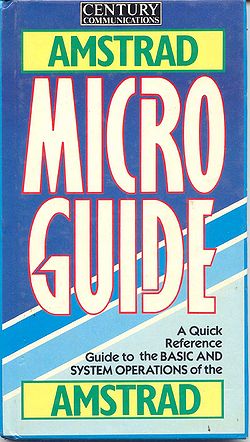Difference between revisions of "Amstrad Micro Guide"
From CPCWiki - THE Amstrad CPC encyclopedia!
Cpcmaniaco (Talk | contribs) |
|||
| Line 41: | Line 41: | ||
15. List of Amstrad keywords | 15. List of Amstrad keywords | ||
</pre> | </pre> | ||
| + | |||
| + | == Review == | ||
| + | |||
| + | The Century Microguide to the Amstrad is a conveniently sized, clearly laid out, quick reference guide for the busy Amstrad owner. lt comprehensively summarizes all the essential information neecled by the Amstrad enthusiast and includes: | ||
| + | |||
| + | * Special Keyboard Features | ||
| + | * Alphabetic Quick Reference | ||
| + | * Locomotive BASIC Commands | ||
| + | * Sound, Graphics, Text and Colour | ||
| + | * Numeric, Trigonometric and String Functions | ||
| + | * Input/Output Functions | ||
| + | * Arithmetic and Logic Operations | ||
| + | * File Handling Commands | ||
| + | * Indirection Operators | ||
| + | * Memory Maps | ||
| + | * Error Handling, Codes and Messages | ||
| + | * Operating System Commands | ||
| + | * Disc System Commands | ||
| + | |||
| + | Each command is illustrated with simple examples to show how it is used in context and there are practical hints throughout the book. | ||
[[Category:Books]] | [[Category:Books]] | ||
Revision as of 08:36, 11 July 2008
A reference guide.
Information
| Title: | Amstrad Micro Guide |
| Authors: | Prof. Peter Morse, Brian Hancock |
| Publiser: | Century Communications LTD. |
| Year: | 1986 |
| Pages: | 27 |
| ISBN: |
Contents
Preface 1. Conventions and terms used 2. Control keys 4. Operating system commands 5. Arithmetic and Logic operations 6. BASIC numeric functions 7. BASIC string functions 8. Graphics commands 9. Sound commands 10. General AMSDOS commands 11. AMSDOS and BASIC file commands 12. CP/M commands 13. Error messages 14. Memeory map 15. List of Amstrad keywords
Review
The Century Microguide to the Amstrad is a conveniently sized, clearly laid out, quick reference guide for the busy Amstrad owner. lt comprehensively summarizes all the essential information neecled by the Amstrad enthusiast and includes:
- Special Keyboard Features
- Alphabetic Quick Reference
- Locomotive BASIC Commands
- Sound, Graphics, Text and Colour
- Numeric, Trigonometric and String Functions
- Input/Output Functions
- Arithmetic and Logic Operations
- File Handling Commands
- Indirection Operators
- Memory Maps
- Error Handling, Codes and Messages
- Operating System Commands
- Disc System Commands
Each command is illustrated with simple examples to show how it is used in context and there are practical hints throughout the book.
